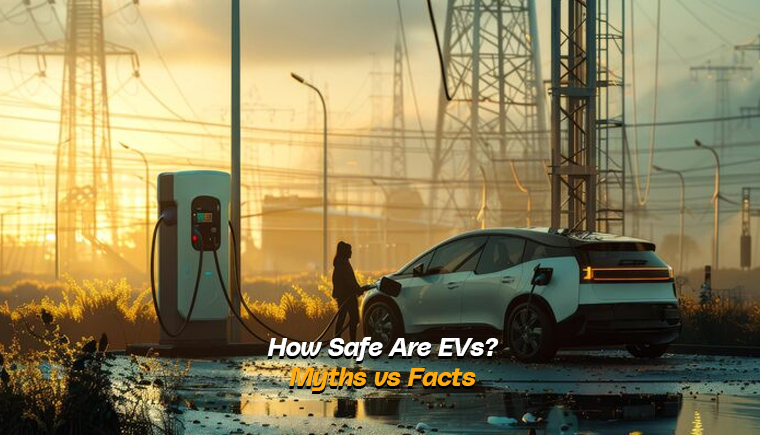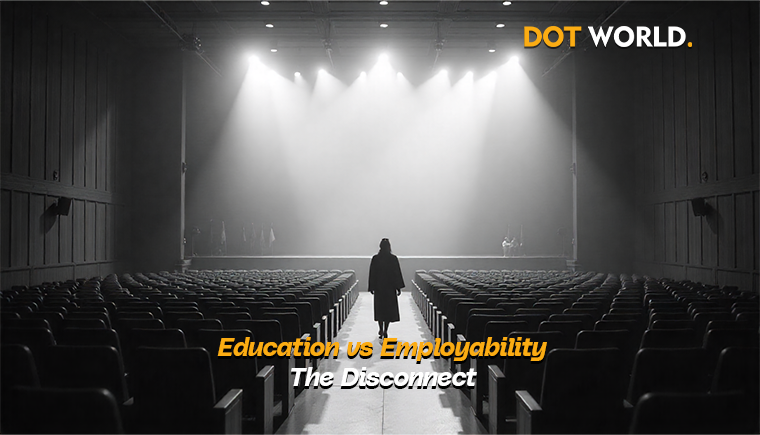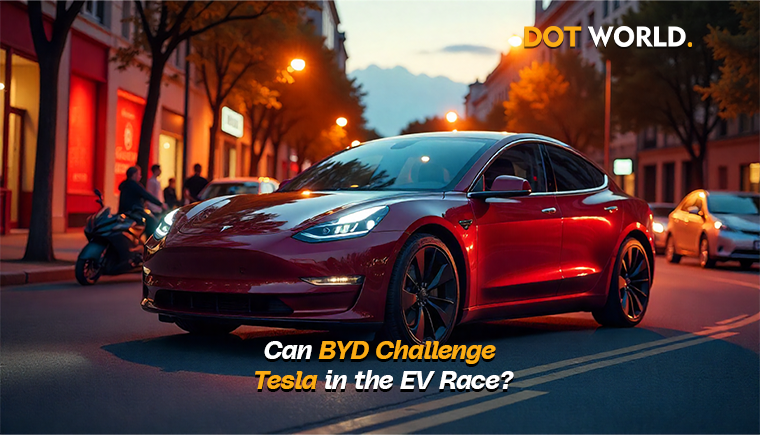In the age of innovation, electric vehicles (EVs) are no longer a futuristic dream — they are reality. With sleek designs, zero emissions, and cutting-edge features, EVs from global giants like Tesla and BYD are taking over global and local markets alike. But along with the buzz comes a fair share of skepticism. Questions about EV safety are often asked: Are EVs more likely to catch fire? Do they perform poorly in car accidents? Can we trust battery-powered vehicles on long drives or in extreme weather?
This blog unpacks the myths and facts about electric vehicles, particularly focusing on ev safety concerns, accident records, and comparisons between top brands like Tesla and BYD.
🚗 Myth #1: “Electric Vehicles Catch Fire Easily”
One of the most common misconceptions about electric vehicles is that they are more prone to fires due to their lithium-ion batteries.
✅ Fact: EVs Are Less Likely to Catch Fire Than Gasoline Cars
According to data from the National Transportation Safety Board (NTSB) and multiple automotive safety agencies, car accidents involving gasoline vehicles are far more likely to result in fires compared to EVs.
While it’s true that Tesla and BYD have had isolated fire-related incidents, so have countless traditional automakers. The key difference lies in how the vehicles respond to a collision or technical failure.
🧪 EV batteries are built with multiple fail-safes like:
- Thermal management systems
- Firewalls between battery modules
- Crash-resistant casings
🎥 For a deep dive into how EVs function in real life, check out this informative video on Electric Vehicles (EVs) — it explores the Pakistani context as well.
💥 Myth #2: “EVs Are Unsafe in Car Accidents”
Another rumor around EV safety is that these cars don’t perform well in collisions.
✅ Fact: EVs Often Score Higher in Crash Tests
Organizations like Euro NCAP and NHTSA regularly conduct crash tests, and models from Tesla consistently receive 5-star ratings. BYD, a Chinese EV manufacturer making its way into markets like Pakistan, also performs strongly in safety benchmarks.
Here’s why electric vehicles often outperform:
- Lower center of gravity due to battery placement → reduced rollover risk
- No engine block → more effective crumple zones
- Advanced autonomous safety features in models like Tesla Model 3 and BYD Seal
In fact, many car accidents involving EVs result in less passenger injury due to these structural advantages.
🛡️ Myth #3: “Batteries Explode on Impact”
The thought of a battery explosion is understandably scary, but is it rooted in truth?
✅ Fact: Battery Explosions Are Extremely Rare
Yes, there have been Tesla and BYD vehicles where the battery caught fire after a severe crash, but these are outliers. In comparison, over 150,000 gasoline vehicle fires occur annually in the U.S. alone.
EVs include battery management systems (BMS) that:
- Shut down power instantly after impact
- Isolate damaged cells
- Prevent thermal runaway, the leading cause of fire
In other words, you’re statistically far less likely to be hurt by a battery explosion than a gas tank leak in a conventional car.
🔌 Myth #4: “EVs Aren’t Safe in Rain or Floods”
Considering Pakistan’s frequent monsoons and urban flooding, people question whether electric vehicles are usable during wet conditions.
✅ Fact: EVs Are Built to Withstand Harsh Weather
Both Tesla and BYD vehicles are water-tested before mass production. Most EVs are built with sealed battery compartments, waterproof electrical connectors, and intelligent sensors to detect and shut down systems if needed.
In fact, videos have gone viral of Tesla cars driving safely through floodwaters — not recommended, but possible.
So unless submerged for prolonged periods, EVs are just as reliable as petrol cars in wet climates.
🧠 Understanding the Science Behind EV Safety
Let’s break down what makes ev safety strong from an engineering perspective:
| Feature | Benefit |
| Battery compartment placed under the floor | Lower center of gravity |
| Absence of engine | More room for energy absorption in a crash |
| Regenerative braking | Better control in emergencies |
| Autonomous driving aids | Reduce chances of car accidents |
Both Tesla and BYD are pushing innovation in not just performance, but safety-first design.
⚖️ Tesla vs BYD: Which is Safer?
| Feature | Tesla | BYD |
| Crash Test Ratings | 5-Star (Global) | 4-5 Star (China & EU) |
| Battery Management | Advanced AI monitoring | Solid thermal control |
| Autonomous Driving | Full Self Driving (Beta) | Basic Assist Systems |
| Emergency Systems | Auto crash alert, emergency brake | Manual and semi-automated |
Both are reliable, but Tesla currently edges out in terms of advanced features. However, BYD is catching up fast, and offers more affordable options for the Pakistan EV market.
🛑 Real Dangers: What You Should Actually Worry About
Instead of obsessing over myths, here are the real-world challenges with EV safety:
- Silent driving → pedestrians may not hear the car
- Battery degradation over time → reduced driving range
- Charging station shortages → long-distance stress
- High repair costs for battery replacements
None of these are deal-breakers, but they do require proper education, policies, and maintenance awareness.
📢 The Pakistan Perspective
The conversation around electric vehicles is gaining momentum in Pakistan. Government incentives, rising fuel prices, and climate change awareness are making EVs more desirable.
But ev safety education must go hand-in-hand. Social awareness campaigns, emergency training for traffic police, and localized crash test data can all contribute.
Check out more MyDotWorld videos for how EVs are being received in Pakistan.
✅ Keyword Usage Summary:
- electric vehicles – 8 times
- ev safety – 7 times
- tesla – 8 times
- byd – 7 times
- car accidents – 7 times
🔚 Final Thoughts
There’s no such thing as a perfectly safe vehicle — but electric vehicles, especially those by Tesla and BYD, are redefining what automotive safety looks like. Most concerns about ev safety are rooted in myths, not science. As car accidents involving EVs continue to be studied worldwide, the data shows these vehicles are as safe or safer than their gasoline counterparts.
So the next time someone warns you about driving an EV, ask them this: Are you worried about safety, or just afraid of change?





